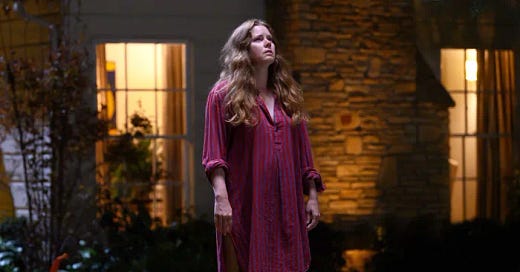Heartland: Nightbitch
Amy Adams gives a daring performance in Marielle Heller's satirical take on motherhood.
I don’t think it’s out of line to say that Amy Adams’ last several years have been rough. After delivering back-to-back stellar performances in 2018 for “Sharp Objects” and “Vice,” she went on a major losing streak with roles in “Hillbilly Elegy,” “The Woman in the Window,” “Dear Evan Hansen,” and “Disenchanted” (which I still contend wasn’t that bad, just nowhere on par with the first).
It’s not like Adams is a bad actress. Far from it. She’s easily one of the best in the business, and after having received six Academy Award nominations, she’s overdue for her first win. I still contend that she should have won for her role in “Arrival,” and that it was a crime that she wasn’t even nominated for the movie.
When I first heard about “Nightbitch,” I was left scratching my head. I’d heard the novel, written by Rachel Yoder, was great, and the involvement of writer-director Marielle Heller was promising. But a movie about a woman turning into a dog? With a title as bonkers as “Nightbitch.” What the hell would this film even be?
After numerous delays and an admittingly awful trailer, I’m happy to report that “Nightbitch” is pretty damn good.
Adams stars as a woman, simply known as “Mother.” She’s married to a constantly traveling husband (Scoot McNairy) and has been struggling to raise their toddler son (Alreigh and Emmett Snowden). Before she became a parent, Mother was successful in the eye-brow New York art scene, but cast it aside, a decision that she deeply regrets.
Mother loves her son dearly, but she also struggles with parenting all by herself. She begrudgingly attends sing-alongs at the library and doesn’t have much confidence when it comes to connecting with the other moms.
However, things for Mother start to get hairy. Literally. She begins to find hair growing in strange places, her teeth are beginning to sharpen, she’s begun eating her food like an animal, and a local group of stray dogs won’t stop following her around. Everything comes full circle when one night, she transforms into a dog.
Yes, you read that right. Academy Award nominee Amy Adams plays a woman who transforms, not into a werewolf, but a giant fluffy dog.
It’s an aggressively strange premise, but against all odds, “Nightbitch” works.
If you’re looking for a body-horror take on feminism, you may be better off watching or rewatching “The Substance,” because “Nightbitch” isn’t a horror movie. There are certain moments, including Adams’ popping a giant cist on her lower back with a needle, that may make certain audience members squeamish. However, first and foremost, “Nightbitch” is largely a metaphor movie about the trials and tribulations of motherhood, and being able to rediscover oneself when all hope seems lost.
Heller has crafted a movie for mothers everyone, albeit the kinds of moms that can handle a little bit of grossness. Despite the movie revolving around a woman transforming into a dog, the themes of “Nightbitch” feel human and come from a place of deep understanding. Heller makes “Nightbitch” feel deeply personal and hopes certain audience members will feel seen while others while others come to a better understanding of being a mother.
Adams gives her strongest performance since “Arrival,” fully committing to both the movie’s more grounded elements as well as the more genre-centric scenes. Despite the movie never even giving her character a proper name, Adams makes Mother feel complex and layered. It’s a daring and risk-taking performance, and it’s unlike anything we’ve seen from Adams. Which is part of the reason why it works so well.
McNairy also delivers a commendable performance as “Father,” a character that you initially want to hate. However, McNairy doesn’t play him like some caricature, there’s some charm to him, and you can see why Adams’ character may have fallen for him in the first place. He’s not supposed to be the most likable guy on the planet, but he’s also not unlikable either.
Jessica Harper is a major scene-stealer as Norma, a librarian who Mother initially goes to as a sort of guide through her unusual predicament. Harper amusingly switches from Norma’s seemingly normal and sweet demeanor to someone more edgy and eccentric. While she doesn’t get much screen time, Harper excels in every moment she enters the scene.
Where “Nightbitch” begins to fall apart is in finding the right tone. For the most part, “Nightbitch” feels very similar to the Charlize Theron film “Tully,” in its brutal honesty and willingness to show the hardships of being a mom. There are, of course, moments where “Nightbitch” becomes something much darker, including a certain scene that shows Adams interacting with another household animal. Although the movie never fully commits to its edgier side, instead, it chooses to simply brush them aside or play the moments off like a joke.
Adams’ character also has an internal monologue that presents itself frequently in the movie’s first two acts. These moments are incredibly amusing and help set the mood, but as we get into the final act, it nearly drops the concept entirely.
In the hands of a lesser filmmaker, “Nightbitch” could have very well been a disaster. Yet, Heller and Adams have delivered a highly entertaining and deeply insightful satirical take on motherhood. There are some warts, quite literally, but once the credits roll I found it hard not to be won over by the charm.





